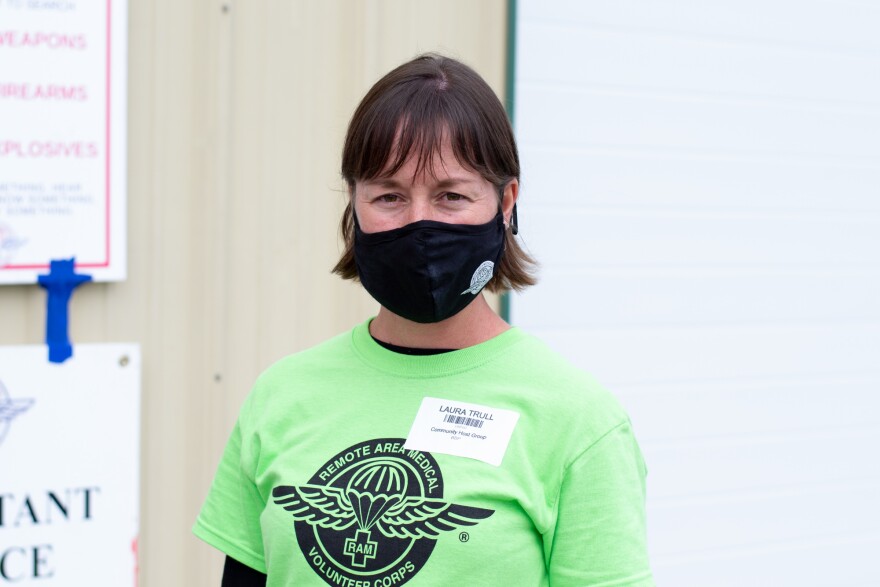Remote Area Medical, or RAM, is a Tennessee-based organization that runs pop-up clinics across the U.S. where people can get free healthcare, including dental and vision services. This weekend, RAM made its second appearance in Harrisonburg. WMRA's Randi B. Hagi reports.
Over the weekend, hundreds of people got their teeth pulled, glasses made, blood sugar checked, and myriad other healthcare services at the Rockingham County Fairgrounds – all for free. RAM, a nonprofit, runs these clinics all over the country to meet the needs of underserved, uninsured, and under-insured people who can't afford to see a doctor.
Lucraisa Simms of Harrisonburg came with the hopes of getting dentures made, so she could actually chew her food.

LUCRAISA SIMMS: They're working on my teeth now, they're making them now … I'm just glad to be getting my dentures.
By the time she arrived at 6:30 a.m., there were already cars starting to fill up the parking lot. Some of them had gotten there the night before, because the clinic runs on a first-come, first-served basis.
At 6 a.m., the clinic doors opened, and people lined up to get their temperatures checked and register for services. In previous years, they would have waited inside the cavernous exhibit hall until it was their turn to see a doctor, dentist, or optometrist. This year, due to COVID-19, folks waited in their cars until summoned via text message.

LAURA TRULL: People are really interested in dental services and vision services particularly. And we're grateful to be able to provide COVID vaccines as well, so that's pretty popular. A lot of the services that aren't covered by something like Medicare.
Laura Trull teaches social work at James Madison University. She's also a community host group leader.
TRULL: The community host group is the local folks who come together to raise money and secure all the local providers and logistics for a RAM clinic to come to their community.
Inside the exhibit hall, patients were triaged by volunteers who directed them towards the services they needed. The dental clinic was set up in this building, too – [dental ambi] – rows of clear plastic tents each contained a dentist's chair and tools, the local dentists all volunteering their time, and patients getting their teeth cleaned, filled, or extracted. Giant, tubular air ducts snaked over the floor, providing ventilation to each tent.
Anu Ahuja drove all the way from Rockville, Md. to get a tooth infection looked at.
ANU AHUJA: I came here, but not sure if they're going to do dental work because my blood pressure was high, so I got medical looked at, and they did a diabetes check and I got a free meter, which is really great. And I learned about how to manage my blood pressure and then I'm getting vision done … I don't have health insurance. That was one of the main reasons I came here.

On the other side of the fairgrounds, volunteer Rebecca Wood worked in the mobile glasses lab, fitting lenses into frames for the prescriptions that providers had issued earlier that day. She began volunteering with RAM when she lived in Charlottesville, but has since moved to Boston, and made the trip to Harrisonburg to pitch in this weekend. She started volunteering after going through her own medical nightmare – a jaw infection.
REBECCA WOOD: [ambient sound of glasses equipment] … I ended up having to have all of my teeth pulled and parts of my jaw scraped away and the infection drained. It was pretty awful. But after I healed from that, I thought, even as bad as it was, I was able to go somewhere in the midnight hour. Like, what do people do when they don't even have that? And so in order to give my losses purpose and meaning, I started volunteering here.
Antonio Flamenco Flores, of Harrisonburg, came to get reading glasses. He got to the clinic at 5:45 a.m. after finishing his shift at Marshall's. He just got hired there, and doesn't have insurance yet.

ANTONIO FLAMENCO FLORES: Yeah, it's really great that it helps the community, and I really appreciate that.
Nearby, core volunteer Dave Maurer oversaw the vision clinic.
DAVE MAURER: I'm very much a believer of trying to give back. I've been blessed with a wonderful job and a wonderful career, and I'm at a point in my life where I can take time to use my vacation to travel to RAM clinics and volunteer my time and give some of my skill and some of my ability back.
Maurer travels to volunteer at 15 to 20 RAM clinics a year. The rest of the time, he lives just outside of Chicago, where he works as a nurse at a county jail.

MAURER: We're always needing volunteers and we're always needing donations. So I would encourage any listener who's interested and wants to learn more to go to our website at RAMusa.org. That's R-A-M-U-S-A dot org. There you can find a full listing of all our clinics throughout the United States and also ways that you can become involved and make a difference. Now the cool thing about Remote Area Medical is that you don't need training. If you come here we'll train you to do a variety of different skill sets, whether it's learning how to make glasses or helping people with dental problems or getting people moved and registered.


